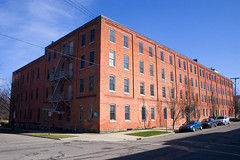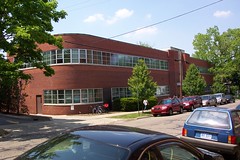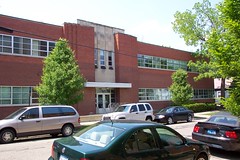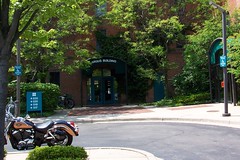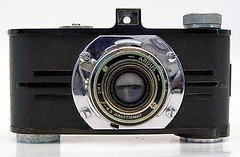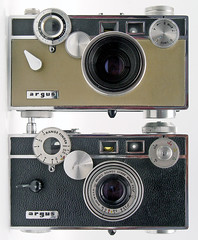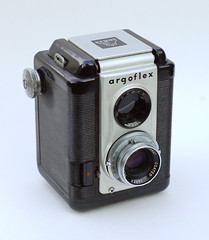Difference between revisions of "Argus"
Hanskerensky (talk | contribs) m (changed photo dependency) |
(rephrased the intro a bit; added townie references; noted buyouts and decline.) |
||
| Line 17: | Line 17: | ||
| image_text=C3 and C3 Matchmatic | | image_text=C3 and C3 Matchmatic | ||
}} | }} | ||
| − | '''Argus''' Inc. was a camera maker based in Ann Arbor, Michigan, USA. Before 1939 it was '''International Research Corporation''', | + | '''Argus''' Inc. was a camera maker based in Ann Arbor, Michigan, USA. Before 1939 it was '''International Research Corporation''', which evolved out of International Radio Corporation, an innovative maker of [[bakelite]] radio sets. It was this American company that brought [[35mm]] film in Kodak's '''135''' cassette to a mass market in the U.S.; especially with its famous brick-shaped [[rangefinder camera]]s, the '''C''' series. The first camera by Argus, the [[Argus A]], resulted from a patent that the company received in 1936, and its surprisingly affordable cost made it a great success. |
| − | Argus became a | + | By the 1950s, Argus had became a significant force in Ann Arbor's economy. Several buildings from its heyday still stand. Two are now used by the University of Michigan; but the main original factory is now remodeled as office space, and owned by "C3 Partners." This building at includes a public area in an upstairs lobby, where a permanent exhibition of Argus cameras is shown: The Argus Museum<ref>[http://gfoxphoto.blogspot.com/2009/08/blog-post.html "Argus Camera Museum, Ann Arbor "] at [http://gfoxphoto.blogspot.com/ Vintage Cameras | Gregory Fox Photography]</ref>. |
| + | |||
| + | Argus's factory was located in a residential neighborhood west of downtown Ann Arbor, which had traditionally been an enclave of German immigrants—particularly from Swabia in southern Germany<ref>[http://aaobserver.aadl.org/aaobserver/15573 "The Story of the Schwaben Halle"], from the ''Ann Arbor Observer'' column "Then And Now," Dec. 2002, archived at [http://aaobserver.aadl.org/node/18520 Ann Arbor District Library]. The Swabian region of Germany was home to [[Dacora|Dacora Kamerawerk]], founded in Reutlingen south of Stuttgart.</ref> | ||
| + | |||
| + | In 1957 Argus was purchased by Sylvania Electric Products Co., who believed there would be a synergy with that firm's strong flashbulb sales. A new South Carolina factory was opened to handle good slide projector sales. However by the late 1950s, Argus was struggling to compete against new Japanese camera imports, which offered better features at a lower price point. In 1959 Sylvania was acquired by GTE; and in 1962 Argu's new corporate owners essentially dumped the company onto [[Mansfield|Mansfield Industries]]—a Chicago photographic distributor and a much smaller company. | ||
| + | |||
| + | In the 1960s, most Argus products became had foreign imports (several from [[Mamiya]]), rebranded with the Argus name. While optics contracts kept some Ann Arbor workers busy, by 1963 camera production had stopped there (a trickle of camera models were made in South Carolina through the 1960s). Starting in 1967 Argus's corporate ownership turned over several more times, with the brand popping up in various guises; but the era of US-designed and -manufactured cameras had ended. | ||
| − | |||
{{Flickr image | {{Flickr image | ||
| image_source=http://www.flickr.com/photos/vincentnip/4371505879/in/pool-camerawiki | | image_source=http://www.flickr.com/photos/vincentnip/4371505879/in/pool-camerawiki | ||
| Line 88: | Line 93: | ||
* [[Argus Lady Carefree]] and [[Argus Flash Sensor 235x]] ([[Sedic]]) | * [[Argus Lady Carefree]] and [[Argus Flash Sensor 235x]] ([[Sedic]]) | ||
* [[Argus V-100]] (German OEM) | * [[Argus V-100]] (German OEM) | ||
| + | |||
| + | ==Notes== | ||
| + | <references/> | ||
== Sources == | == Sources == | ||
Revision as of 07:09, 7 March 2011
Argus buildings:

|
| C3 and C3 Matchmatic |
Argus Inc. was a camera maker based in Ann Arbor, Michigan, USA. Before 1939 it was International Research Corporation, which evolved out of International Radio Corporation, an innovative maker of bakelite radio sets. It was this American company that brought 35mm film in Kodak's 135 cassette to a mass market in the U.S.; especially with its famous brick-shaped rangefinder cameras, the C series. The first camera by Argus, the Argus A, resulted from a patent that the company received in 1936, and its surprisingly affordable cost made it a great success.
By the 1950s, Argus had became a significant force in Ann Arbor's economy. Several buildings from its heyday still stand. Two are now used by the University of Michigan; but the main original factory is now remodeled as office space, and owned by "C3 Partners." This building at includes a public area in an upstairs lobby, where a permanent exhibition of Argus cameras is shown: The Argus Museum[1].
Argus's factory was located in a residential neighborhood west of downtown Ann Arbor, which had traditionally been an enclave of German immigrants—particularly from Swabia in southern Germany[2]
In 1957 Argus was purchased by Sylvania Electric Products Co., who believed there would be a synergy with that firm's strong flashbulb sales. A new South Carolina factory was opened to handle good slide projector sales. However by the late 1950s, Argus was struggling to compete against new Japanese camera imports, which offered better features at a lower price point. In 1959 Sylvania was acquired by GTE; and in 1962 Argu's new corporate owners essentially dumped the company onto Mansfield Industries—a Chicago photographic distributor and a much smaller company.
In the 1960s, most Argus products became had foreign imports (several from Mamiya), rebranded with the Argus name. While optics contracts kept some Ann Arbor workers busy, by 1963 camera production had stopped there (a trickle of camera models were made in South Carolina through the 1960s). Starting in 1967 Argus's corporate ownership turned over several more times, with the brand popping up in various guises; but the era of US-designed and -manufactured cameras had ended.

|
| image 1940's, by Charles Dunlap |
Contents
List of Argus Cameras
A-series
A-series Links
C-series
- Argus C
- Argus C2
- Argus C3
- Argus C3 colormatic
- Argus C3 Golden Shield
- Argus C3 MatchMatic
- Argus C3 Standard
- Argus C33
- Argus C-twenty
Autronic Series
- Argus Autronic 35
- Argus Autronic C3
- Argus Autronic I
- Argus Autronic II
TLR
- Argus 40
- Argus 75
- Argus Super Seventy-Five
- Argus Argoflex 40
- Argus Argoflex E
- Argus Argoflex EF
- Argus Argoflex EM
- Argus Argoflex II
- Argus Argoflex Seventy-Five
Other
- Argus A-Four
- Argus C4
- Argus C44
- Argus C44R
- Argus C4 Modified
- Argus C4R
- Argus Model M
- Argus 127 (Whitehouse Products)
- Argus CR-2 (Chinon)
- Argus/Cosina STL 1000 (Cosina)
- Argus Lady Carefree and Argus Flash Sensor 235x (Sedic)
- Argus V-100 (German OEM)
Notes
- ↑ "Argus Camera Museum, Ann Arbor " at Vintage Cameras | Gregory Fox Photography
- ↑ "The Story of the Schwaben Halle", from the Ann Arbor Observer column "Then And Now," Dec. 2002, archived at Ann Arbor District Library. The Swabian region of Germany was home to Dacora Kamerawerk, founded in Reutlingen south of Stuttgart.
Sources
Links
- Argus C: the first best-selling 135 film camera (1938), at DCView (in Chinese, English translation)
- The Argus Museum: Ann Arbor's Hidden Treasure (PDF), by Henry Gambino, at The Argus Museum
- Argus page at Collection G. Even's site
- Various Argus Camera at Sylvain Halgand's collection
- Argus Camera Historyon the Argus Company site
- Argus Camera Photographers Group and Pool on Flickr
- When was my Argus camera made?, by Phillip G. Sterritt, at Photo.net
- Argus still camera and slide projector reference guides, by Phillip G. Sterritt, at Photo.net
Manuals
Books
- DESCHIN, Jacob. Picture making with the Argus C3, C4, A4: A working manual. Camera Craft Pub. Co., San Francisco, 1954. Library of Congress 54012589.
- GAMBINO, Henry J. Argomania: A look at Argus cameras and the company that made them. Aeone Communications, Doylestown (Pennsylvania), 2005. ISBN 0-9770507-0-X.
- KUZYK, Hrad. 35mm for the proletariat: A modern user's guide to the Argus A/A2 camera. Hrad Kuzyk, 2007. ISBN 0615144888.
- LAHUE, Kalton C. and BAILEY, Joseph A. Collecting vintage cameras, vol. 1: The American 35mm. American Photographic Book Publishing Company, New York, 1972. ISBN 081740547X.
- LAHUE, Kalton C. and BAILEY, Joseph. Glass, brass, & chrome. University of Oklahoma Press, Oklahoma, 1972. ISBN 0-8061-0968-8. 2002: ISBN 0-8061-3434-8.
- MURPHY, Burt. Argus 35mm photography. Verlan Books, New York, 1959. Library of Congress 59015881.
- TYDINGS, Kenneth. The Argus 35mm guide and reference book. Greenburg, New York, 1952. Library of Congress 52008125.
